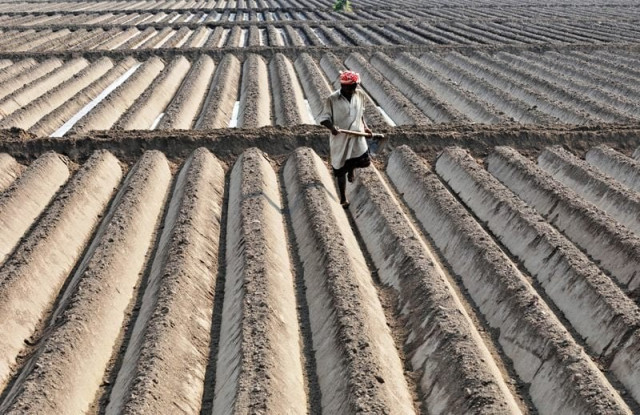Equitable distribution: ‘Restructuring land ownership key to alleviating poverty’
Speakers say a 1989 court judgment declaring land reforms ‘un-Islamic’ does not hold weight.

Pakistan has 2.6 million acres of cultivable land which if divided into five-acre lots could create assets for country’s 897,000 tenant farmers, says Akmal Hussain. PHOTO: AFP/FILE
Land reforms, especially assets creation for landless peasants, are fundamental to poverty alleviation, while public debate on the 1989 court judgment declaring these reforms as un-Islamic must be generated. This was the crux of a seminar, titled, “Addressing the Inequality Gap: A Dialogue of Land Rights” on Monday.
The discussion was jointly organised by the South Asia Partnership-Pakistan and Sustainable Policy Development Institute.
The speakers said there was a strong correlation between poverty and land holdings, in that poverty increases as land ownership decreases. Some estimates suggest that around half of all rural households own no land while the top five per cent own over one-third of all cultivated land.
This may explain why around 40 per cent of Pakistanis live in poverty, said panelist and agri-economist Akmal Hussain.

“Poverty is the biggest injustice,” he said. “Is it un-Islamic to want to end it by restructuring land ownership?”
The speakers said that support prices benefited large landowners while tenant farmers had neither the incentive nor the capacity to increase their productivity. They stressed on the need for agricultural policies to focus on small farmers.
Hussain said 57 per cent of poor farmers who owed money to landowners cultivated land for free while 14 per cent did the same for just Rs28 per day. He said the Pakistani state had 2.6 million acres of cultivable land which if divided into five-acre lots could create assets for 58 per cent of the country’s 897,000 tenant farmers.
The remaining 42 per cent could be given loans to purchase their own land through a fund that Hussain estimated would be worth around Rs4 billion.
He said that a Small Farmer Development Corporation — an enterprise wherein small farmers are shareholders — could be created to provide technical services to farmers.
Earlier, Lahore University of Management Sciences Associate Professor Faisal Bari had said that interest groups who were against land reforms were merely using the excuse of a Supreme Court (SC) Shariat Appellate Bench judgment that had declared land reforms un-Islamic and resulted in the cancellation of the 1977 Land Reforms Act.
Bari said the judgment did not provide many arguments against land reforms except that Islam had not imposed an upper limit on land holdings and that the state should provide compensation for acquiring land.
On the other hand, he added, land reforms were important for social and market reforms. In 2011, the Workers Party Pakistan, now the Awami Workers Party, had filed a petition in the SC for land reforms in Pakistan and tied it in with a separate petition on electoral reforms. The apex court passed a judgment in favour of electoral reforms but the land reforms case is still ongoing.
The participants pointed out that Egypt and Indonesia had also undergone land reforms without concerns from religious scholars. They said Pakistan should learn from agricultural best practices in India while land reforms should entail a gender component wherein new land holdings are handed over to women farmers.
Published in The Express Tribune, June 25th, 2013.



















COMMENTS
Comments are moderated and generally will be posted if they are on-topic and not abusive.
For more information, please see our Comments FAQ